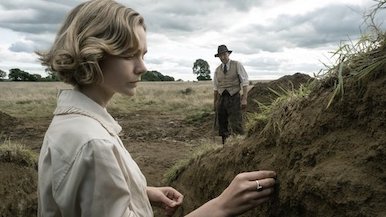|
|
The 400-Word Review: The DigBy Sean CollierJanuary 31, 2021
Pretty is a authentic historical figure whose flair for archeology was nestled in the otherwise depressing final years of her life; her husband died of stomach cancer in 1930, eight years before Pretty’s own premature death at 59. In those final years, she contracted Basil Brown (Ralph Fiennes), a local excavator — not an archeologist, he clarifies — to unearth whatever lies on her property. Brown, also based on a real figure, bonds with Pretty’s young son (Archie Barnes) and steams when representatives of the British museum take control of the proceedings. “The Dig” loses a bit of its verve at this point, introducing a string of secondary characters who crowd in like the movie is an overstuffed elevator. Lily James comports herself well as a young archeologist with a bad marriage, superfluous though the character is. Director Simon Stone pours a great deal of soul into “The Dig,” though I’m inclined to save the laurels for cinematographer Mike Eley. He’s responsible for a hundred breathtaking shots of the English countryside at sunset; those images, more than anything, may explain my admiration for the film. Such is the nature of indefinably lovely films. It could be deliberate and immensely subtle touches of filmmaking; it could also be pretty landscapes. My Rating: 8/10 “The Dig” is streaming on Netflix.
[ Read more 400 word movie reviews ]
[ View other movie reviews ]
[ View other columns by Sean Collier ] [ Email this column ]
|

|
|
|

|
Thursday, October 31, 2024
© 2024 Box Office Prophets, a division of One Of Us, Inc.


